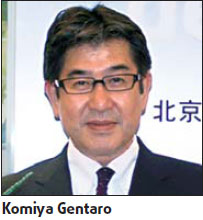

The worst times may be around the corner for the advertising industry as the global economic crisis worsens.
But for Dentsu, Japan's top advertising company, these could also be the best times.

"This hard time is a chance for us to rethink strategies for the next five years. It gives us an opportunity to reposition and restructure ourselves and innovate our business models and services," said Komiya Gentaro, president and director of the board of Beijing Dentsu Advertising Co Ltd. Beijing Dentsu, a joint venture 70 percent controlled by Dentsu, is one of the most profitable advertising firms in China.
When times are tough, advertising may be one of the first areas of spending to come under the knife. Ad companies that used to rely on agency commission must find a different business model to cope with the financial crisis, Komiya said.
"When the economy is booming, clients increase their budget. If we can partner with a good client, we can grow automatically. But now our clients are getting more and more cost-oriented. Their budget is tight and what they expect from us is a highly efficient ad campaign that's cheaper and has a bigger impact. We will reconsider our business structure to better meet the needs of our clients by offering more efficient marketing ways," Komiya said.
"Our target is not to be an ad agent. We want to be a strategic partner of our clients," he added.
Strategic consulting is a new gateway of value-added services for clients. Komiya said Dentsu is trying to get closer to clients' business decision-making level to expand its capability upward from the execution of ad campaigns to strategic and managerial consulting services.
For example, integrated branding services have been a major part of Dentsu's offerings. The Japanese company said consulting is much more than a temporary job and a brand-building partner needs to ensure that each phase of a brand's life is dealt with effectively. Dentsu's services range from brand creation and the implementation of brand strategy to brand evaluation.
With offices in Beijing, Shanghai and Guangzhou, Dentsu plans to expand to inland cities of China and is exploring merger and acquisition opportunities in the country, Komiya said.
"The current situation is a good opportunity to reorganize ourselves internally to make our work more efficient and to create more synergies among our local offices," Komiya said.
He said it is also increasingly important for ad agencies to get the most out of their clients' ad budget by incorporating not only traditional media but also new media such as the Internet.
Last year Dentsu established an online advertising company with Hua Kuang Advertising Co Ltd, a wholly owned subsidiary of Focus Media Holding Ltd. The joint venture, called &c Inc, is 67 percent controlled by Dentsu and 33 percent owned by Hua Kuang.
Dentsu was one of the first foreign ad companies to open an office in China in 1981 when the country was not seen as a particularly promising market. Many multinational companies initially expanded to China because of low production costs. But by the mid-1990s China had emerged into an increasingly important consumer market for multinational companies as its economy boomed. Many international advertising companies started to enter China at that time. In 1994 Dentsu formed a joint venture, Beijing Dentsu, in China with two local companies. Beijing Dentsu is 28 percent owned by China International Advertising Corp and 2 percent held by Beijing Dacheng Advertising Co Ltd.
Beijing Dentsu was ranked No 1 in terms of ad companies' revenue in China between 2003 and 2006. Its revenues in 2007 reached 790 million yuan. With its double-digit annual growth rate, the Chinese market accounts for the largest amount of revenue in terms of Dentsu's international operations.
"China is the brightest star in our international operations and our headquarters wants us to grow further," Komiya said.
(China Daily 02/16/2009 page3)













